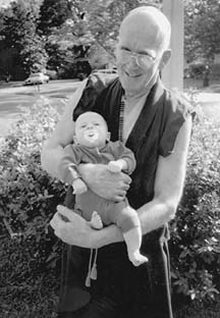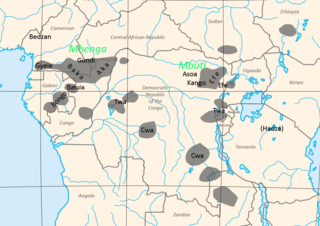
Colin Macmillan Turnbull was a British-American anthropologist who came to public attention with the popular books The Forest People and The Mountain People, and one of the first anthropologists to work in the field of ethnomusicology.

In anthropology, pygmy peoples are ethnic groups whose average height is unusually short. The term pygmyism is used to describe the phenotype of endemic short stature for populations in which adult men are on average less than 150 cm tall.

Pierre-Laurent Aimard is a French pianist.

Simha Arom is a French-Israeli ethnomusicologist who is recognized as a world expert on the music of central Africa, especially that of the Central African Republic. His books include African Polyphony and Polyrhythm: Musical Structure and Methodology (1991) ISBN 0-521-24160-X. He also made some historical field recordings of the Aka Pygmy music.

The Aka or Biaka are a nomadic Mbenga pygmy people. They live in south-western Central African Republic and in northern Republic of the Congo. They are related to the Baka people of Cameroon, Gabon, northern Congo, and southwestern Central African Republic.

The Baka people, known in the Congo as Bayaka, are an ethnic group inhabiting the southeastern rain forests of Cameroon, northern Republic of the Congo, northern Gabon, and southwestern Central African Republic. They are sometimes called a subgroup of the Twa, but the two peoples are not closely related. Likewise, the name "Baka" is sometimes mistakenly applied to other peoples of the area who, like the Baka and Twa, have been historically called pygmies, a term that is now considered derogatory.
Outback were a world music group founded in the late 1980s by multi-instrumentalists Graham Wiggins and Martin Cradick. The group fused traditional Australian tribal music, represented primarily through Wiggins's didgeridoo, with modern Western music, mostly Cradick's steel-string guitar. Before the band dissolved in 1992, it had been joined by Senegalese percussionist Sagar N'Gom, French violinist Paddy Le Mercier and drummer Ian Campbell.
Baka Beyond is a world music group formed in 1992 with members from a wide variety of backgrounds and cultures, fusing Celtic and other western music styles with traditional Baka music from Cameroon.
Atna Jean Emmanuel (Manu) Njock, aka Zekuhl, is a singer, guitarist, percussionist and a songwriter of world music. He presents a Bolbo-Jazz style. He sings in Bàsàa, French and English.
Steven Feld is an American ethnomusicologist, anthropologist, and linguist, who worked for many years with the Kaluli (Bosavi) people of Papua New Guinea. He earned a MacArthur Fellowship in 1991.
Jean-Pierre Hallet was a Belgian ethnologist, naturalist, and humanitarian known best for his extensive work with the Efé (Bambuti) pygmies of the Ituri Rainforest. He wrote the 1964 autobiographical book, Congo Kitabu, the 1973 ethnologic book Pygmy Kitabu, and the 1968 book Animal Kitabu, which details his extraordinary collection of animals in the Congo and in Kenya. He initiated the Pygmy Fund for the benefit of the Efé.
The Bongo people, also called Babongo or Bazimba, are an agricultural people of Gabon in equatorial Africa who are known as "forest people" due to their recent foraging economy.
Aka, also known as Yaka or Beka, is a Bantu language spoken in the Central African Republic and Republic of Congo, along the Ubangi River dividing the two countries.
Baka is a dialect cluster of Ubangian languages spoken by the Baka Pygmies of Cameroon and Gabon. The people are ethnically close related to the Aka, collectively known as the Mbenga (Bambenga).However, the languages are not related, apart from some vocabulary dealing with the forest economy, which suggests the Aka may have shifted to Bantu, with an estimated 15000 people have shifted.
An Anthology of African Music is a series of recordings of traditional music that was made for the International Music Council by the International Institute for Comparative Music Studies and Documentation (Berlin/Venice) and released on the Musicaphon label by Bärenreiter (Kassel/Basel/London). The series was directed by Paul Collaer. It was part of the larger and longer enduring UNESCO Collection series.
Musical Atlas is a series of recordings of traditional music that was made for the International Music Council by the International Institute for Comparative Music Studies and Documentation (Berlin/Venice) and released on the EMI/Odeon label. The series was directed by Alain Daniélou. It was part of the larger UNESCO Collection series. Most of the recordings were later re-issued on the Naive/Auvidis label.

The term Congo Pygmies refers to "forest people" who have, or recently had, a hunter-gatherer economy and a simple, non-hierarchical societal structure based on bands, are of short stature, have a deep cultural and religious affinity with the Congo forest and live in a generally subservient relationship with agricultural "patrons", with which they trade forest products such as meat and honey for agricultural and iron products.

The Great Lakes Twa, also known as Batwa, Abatwa or Ge-Sera, are a Bantu speaking group native to the African Great Lakes region on the border of Central and East Africa. As an indigenous pygmy people, the Twa are generally assumed to be the oldest surviving population of the Great Lakes region. Current populations of Great Lakes Twa people live in the states of Rwanda, Burundi, Uganda and the eastern portion of the Democratic Republic of Congo. In 2000 they numbered approximately 80,000 people, making them a significant minority group in these countries. The largest population of Twa is located in Burundi estimated in 2008 at 78,071 people.

The African Pygmies are a group of ethnicities native to Central Africa, mostly the Congo Basin, traditionally subsisting on a forager and hunter-gatherer lifestyle. They are divided into three roughly geographic groups:

The Meeting Pool is an album by Baka Beyond, released in 1995. It was a collaboration between British musicians and the Cameroonian Baka. Martin Cradick, the founder and guitar player for the group, decided to make a second album after the success of the first, Spirit of the Forest.











